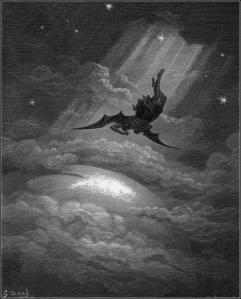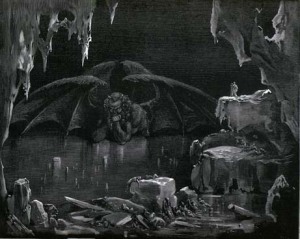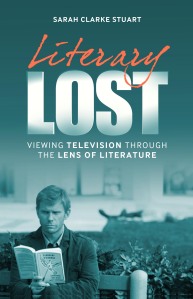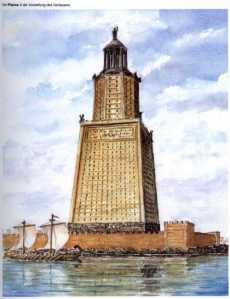The only thing more interesting than a story set in hell is a story that might be set in hell. “Ab Aeterno” features not only a timeless narrative theme–the nature of evil–but also a classic literary device–ambiguity. Let’s face it: the writers of Lost intentionally leave things open to interpretation and I doubt that even “The End” (the series finale) is going to change that. However, I don’t think that Jacob and the Man in Black are supposed to be morally ambiguous figures; if there must be a devil, it’s pretty clear who plays the role of “El Diablo” here. But the most interesting part of this episode is the uncertainty that Richard raises about the nature of the island.

The island as cork (courtesy of abc/Disney)
The following passages will consider the nature of evil, and various notions of hell, in literary and mythological terms.
The Book of Job
The biblical book of Job chronicles the test of the human spirit, illustrated by one man, an exemplary figure in God’s eyes. The story is structured around a debate about human nature between God and Satan. Satan challenges God, claiming that Job is only a good man because he is wealthy, secure and surrounded by friends and family. If he were challenged by poverty or illness, Satan argues, Job would curse God and turn away from him. In essence, Satan believes humans to be selfish beyond all hope. There is no use redeeming man.
I’m not the first to acknowledge the similarities between this biblical text and the discussion between Jacob and the Man in Black. I have compared many Lost scenes to other religious stories, but this one seems to fit these two characters best. In this book, both Satan and God resemble the gods of ancient Greek and Roman mythology who are not necessarily all-powerful. Jacob and the Man in Black do have their own special powers, but they are both limited in what they can do. Jacob tells Richard that he can’t step in and make people do the right thing. They have to figure it out for themselves. In the same way, both God and Satan seem to agree that if people know they are going to be rewarded for worshiping God, their motive is a selfish one, making them unworthy of redemption.
According to Robert Sutherland, author of Putting God on Trial: The Biblical Book of Job, “The implicit restriction that Satan places on God is that God is prohibited from explicitly giving Job the reason for suffering. The concern is that any disclosure of a reason behind suffering might give Job a selfish motive to worship God and ultimately to manipulate him. If Job is truly the man God believes him to be, then Job will worship God regardless of what God might do for him. And so, Satan leaves the presence of God in heaven to create Hell on earth.” The idea that God’s people can’t know the reason for their suffering seems to resonate with the experience of being lost and the the experience of watching Lost. Viewers don’t understand their reasons for suffering much more than the characters do, but those who develop faith in themselves, and in the right leaders, seem to do okay. (Think Hurley).
Also notable in the book of Job is the man himself, in comparison to Richard Alpert. Like Job, Richard suffered the loss of his home and family (Isabella), an unjust punishment, and physical torture. At his darkest moment of despair, the Man in Black comes to him and unchains him. This recalls God’s command that Satan may do whatever he wants to Job except kill him or “lay a hand on his person.” Perhaps, Richard was on the brink of death when the Man in Black came to him. He wasn’t allowed to let Richard die and go to hell, but he could tempt him and lie to him as much as he wanted. “It’s good to see you out of those chains” is code for “welcome to the playground of good versus evil. Game on!” It’s also interesting that Job lived for 140 years after the end of his trial and Richard, too, has lived for 140 more years. This can’t be a coincidence. Looks like somebody’s been reading the bible…

Lucifer's fall to earth created an island
Lucifer’s Fall and the Making of an Island
According to Christian lore, Lucifer (Latin for “light-bearer” or “light bringer”) was a fallen angel, cast down from heaven. He has also been referred to as “the Morning Star” and it seems appropriate here to recall the creepy rendition of “Catch a Falling Star” from the post-massacre scene at the end of “Sundown.” In Dante’s Inferno, Lucifer’s expulsion from heaven and fall to earth displaced a large chunk of earth which was thrust up to the surface, forming an island called Purgatory. Despite the writers’ denial of the Lost island as Purgatory, it’s always interesting to consider it as a metaphorical Purgatory, where the tension between good and evil is revealed. With this image of displaced earth forming Dante’s “Purgatorio,” should we envision it as a place that keeps Satan and all of his evil suppressed, (or corked)? Does Purgatory maintain balance in the universe? Does it act as a threshold between earth and hell? More important, will everyone fall into hell if the evil is unleashed, as Hurley suggests?

Dante’s Inferno
“Midway on our life’s journey, I found myself/ In dark woods, the right road lost”
Such begins Dante Alighieri’s Divine Comedy, section I, Inferno, an allegorical journey exploring the nature of evil. Inferno describes a descent into the nine circles of hell where Virgil, the classical Roman poet, serves as tour guide. Similar to Dante, Jack Shephard finds himself in the “woods,” “midway on life’s journey,” a life that seems to be humming along just fine (on a superficial level, at least) until the plane crash.
“Abandon all hope, you who enter here”
These words, familiar to even modern readers, are inscribed on the gates to hell in Dante’s Inferno. There is no escape from this city and those who enter might as well leave any shred of hope at the door. Richard conveys a similar message to the other characters in the opening scene of “Ab Aeterno,” as his faith quickly disintegrates upon the death of Jacob. So when he says “we are in hell” he is speaking the truth, in the sense that hell is a state of mind devoid of all hope.
The third circle of hell
Though it’s been acknowledged many times before, I feel the need to include the Cerberus bit once again for anyone who missed it. Cerberus, a monster originating in Greek mythology, is also a resident of Dante’s Inferno. It is described as a “three-headed dog-like beast who guards the gluttons.” Recall that in Lost the vents from which the Smoke Monster escapes are called “cerberus vents” and that the Smoke Monster has been referred to as a “security system” or guardian of the island.
Episode 9
In this depiction of the afterlife, Lucifer is a prisoner and forever fixed in the ground of the ninth circle of hell. This is the final and lowest level of hell, and stands in stark contrast to the next scene when Dante ascends to the surface of the earth saying, “To get back up to the shining world from there/ My guide and I went into that hidden tunnel…/Where we came forth, and once more saw the stars.” Richard also ascends out of his hell, after his faith is restored by Hurley and Isabella. Note that we are in the “ninth circle” of Lost as well–that is, the ninth episode into the season. Will we ascend into the clear light of day…with more and more answered questions?

Lucifer held prisoner in the ninth circle of hell
Thanks for reading. There is so much more to say about this episode but it will have to wait for the book.
 Announcing the official publication of Literary Lost: Viewing Television through the Lens of Literature by Sarah Clarke Stuart.
Announcing the official publication of Literary Lost: Viewing Television through the Lens of Literature by Sarah Clarke Stuart.






